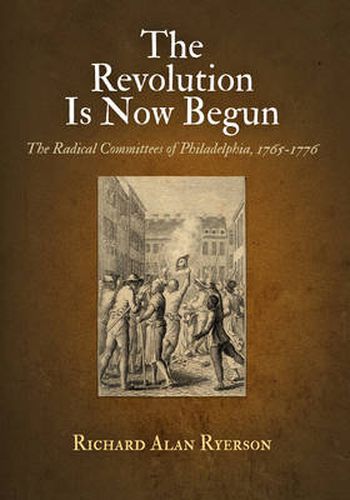Readings Newsletter
Become a Readings Member to make your shopping experience even easier.
Sign in or sign up for free!
You’re not far away from qualifying for FREE standard shipping within Australia
You’ve qualified for FREE standard shipping within Australia
The cart is loading…






This title is printed to order. This book may have been self-published. If so, we cannot guarantee the quality of the content. In the main most books will have gone through the editing process however some may not. We therefore suggest that you be aware of this before ordering this book. If in doubt check either the author or publisher’s details as we are unable to accept any returns unless they are faulty. Please contact us if you have any questions.
The success of the American Revolution is less likely to be understood through an examination of its ideological origins than through a close analysis of the political processes by which principles, beliefs, and anxieties were translated into revolutionary action. This book offers the first detailed profile of the several hundred obscure committeemen and propagandists who took up the new revolutionary ideology and carried it that one last step: out of the realm of rhetoric and into the domain of concrete change. And participatory democracy as a principle of American government owes its realization largely to these second-rank politicians and ordinary citizens, who provided the basic muscle of Revolutionary politics.
In the 1760s and early 1770s Pennsylvania lacked nearly every ingredient for revolution found elsewhere in the colonies: a strong dissenting tradition, widely felt economic grievances, or a legislature intimately acquainted with royal government. Only the painstaking enlistment of a strong leadership core, the construction of new political institutions, and the rapid mobilization of the majority of the community could overcome these deficiencies. In Pennsylvania British authority succumbed to the activity of a few hundred men who were drawn into public life by a handful of veteran politicians within just two years. To these men and to their committees Pennsylvania owes its revolution.
In his book Richard Alan Ryerson focuses on the daily business of politics in the Revolutionary period-the art of motivation for radical political purposes-and its economic and social dimensions in the most prominent American city of the time. How were the colonists mobilized for resistance? What was the political process? Who were the disaffected people who became the radical leaders of the Philadelphia community?
To answer these questions, Ryerson compares campaigning styles, nomination and election procedures, and local political organizations in the colonial era with their counterparts during the Revolution. He also examines the age, economic status, religious faith, and national origins of the men who formed the radical committees of Philadelphia between 1765 and 1776.
$9.00 standard shipping within Australia
FREE standard shipping within Australia for orders over $100.00
Express & International shipping calculated at checkout
This title is printed to order. This book may have been self-published. If so, we cannot guarantee the quality of the content. In the main most books will have gone through the editing process however some may not. We therefore suggest that you be aware of this before ordering this book. If in doubt check either the author or publisher’s details as we are unable to accept any returns unless they are faulty. Please contact us if you have any questions.
The success of the American Revolution is less likely to be understood through an examination of its ideological origins than through a close analysis of the political processes by which principles, beliefs, and anxieties were translated into revolutionary action. This book offers the first detailed profile of the several hundred obscure committeemen and propagandists who took up the new revolutionary ideology and carried it that one last step: out of the realm of rhetoric and into the domain of concrete change. And participatory democracy as a principle of American government owes its realization largely to these second-rank politicians and ordinary citizens, who provided the basic muscle of Revolutionary politics.
In the 1760s and early 1770s Pennsylvania lacked nearly every ingredient for revolution found elsewhere in the colonies: a strong dissenting tradition, widely felt economic grievances, or a legislature intimately acquainted with royal government. Only the painstaking enlistment of a strong leadership core, the construction of new political institutions, and the rapid mobilization of the majority of the community could overcome these deficiencies. In Pennsylvania British authority succumbed to the activity of a few hundred men who were drawn into public life by a handful of veteran politicians within just two years. To these men and to their committees Pennsylvania owes its revolution.
In his book Richard Alan Ryerson focuses on the daily business of politics in the Revolutionary period-the art of motivation for radical political purposes-and its economic and social dimensions in the most prominent American city of the time. How were the colonists mobilized for resistance? What was the political process? Who were the disaffected people who became the radical leaders of the Philadelphia community?
To answer these questions, Ryerson compares campaigning styles, nomination and election procedures, and local political organizations in the colonial era with their counterparts during the Revolution. He also examines the age, economic status, religious faith, and national origins of the men who formed the radical committees of Philadelphia between 1765 and 1776.